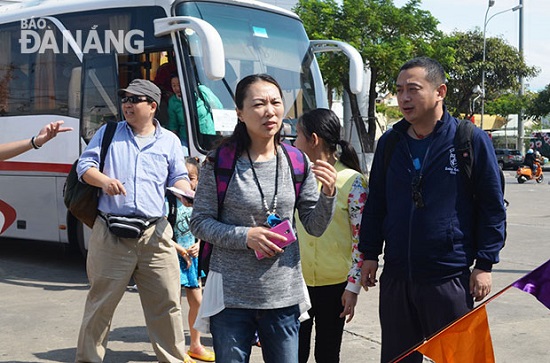Illegal Chinese tour guides problem needs resolving
Over recent days, there have been many reports of Chinese nationals working illegally as tour guides for Chinese tour groups visiting Da Nang, even though the city has around 360 Vietnamese guides who speak Chinese. These local guides are now in fear of becoming unemployed.
The move is blighting the city’s tourism image and raising worries amongst the general public about whether or not these unlicensed Chinese tour guides are giving out accurate information about Viet Nam’s politics, culture, history and geography to their compatriots during their stay in the city.
According to Viet Nam’s regulations about tourism activities, all Viet Nam-based travel agencies serving foreign tourists must only use domestic tour guides, with no foreigners allowed to work as tour guides.
 |
| Chinese tourists visiting the city |
Many tourist companies have been established in the city under the names of Vietnamese nationals, with the aim of offering services exclusively to Chinese tourists. However, these companies are in fact run by Chinese people but are disguised as Vietnamese-owned entities.
The companies usually hire Da Nang’s Chinese-speaking guides to work as ‘sitting guides,’ or ‘scapegoats,’ and their job is purely to deal with the local inspection teams from the city authorities whenever a foreign tourist group is checked. The majority of these ‘sitting guides’ do have international tourist guide cards, yet they just accompany a group whilst the Chinese nationals do all the talking.
If a group of Chinese holidaymakers is inspected, the ‘sitting guide’ is introduced as the official tour guide, and the Chinese national who has actually guided the tourists around the city is referred to as the group leader.
According to the municipal Department of Tourism, so far this year the city has welcomed 185,620 Chinese tourist arrivals, up 61.5% against the same period last year.
Local tourism experts affirm that these unlicensed Chinese tour guides have often lived in Viet Nam for many years. They are usually proficient in the Vietnamese language, and have a thorough grasp of Vietnamese laws, so they are employing cunning tricks to defy the country’s regulations.
Chairman of the city’s Travel Association Cao Tri Dung noted that travel agencies in China usually offer tours to Viet Nam for Chinese tourists at very low prices. Once they arrive in Da Nang, they are taken to particular shops in the city that only serve Chinese tourists, and the tour organisers and guides are paid hefty commissions for taking them there.
He suggested that the Vietnamese and Chinese governments should make greater efforts to deal with this issue which is of high concern. Meanwhile, the city authorities should tighten their management of local travel agencies which organise tours for Chinese tourists, and increase the monitoring of their compliance with the Vietnamese Tourism Law. Importance should also be attached to keeping a closer eye on Chinese nationals who are living and working in the city, and the local shops which exclusively serve Chinese tourists.
Meanwhile, Da Nang’s Chinese-speaking guides hope that the local relevant agencies and tourism companies will work closely together to deal with this problem and ensure their job security.
Director of the city’s Tourism Department Ngo Quang Vinh vowed that his agency would urge the municipal authorities to set up a local tourism police force to ensure a healthy local tourism environment.